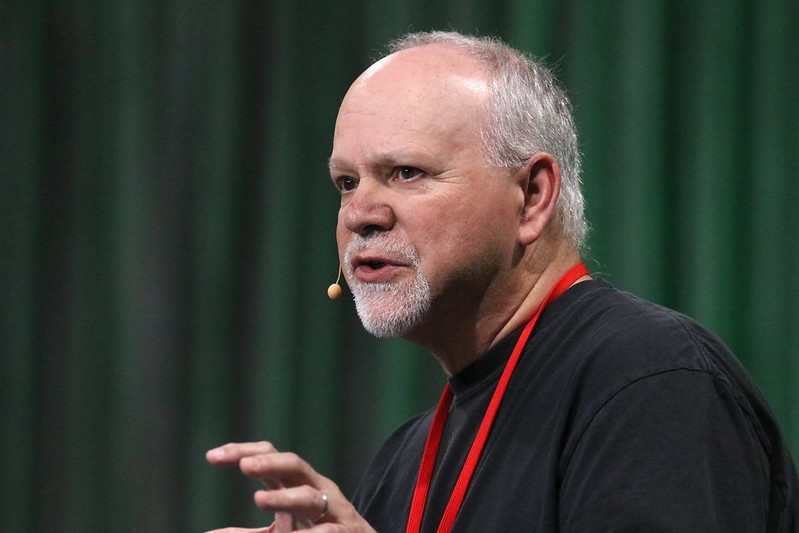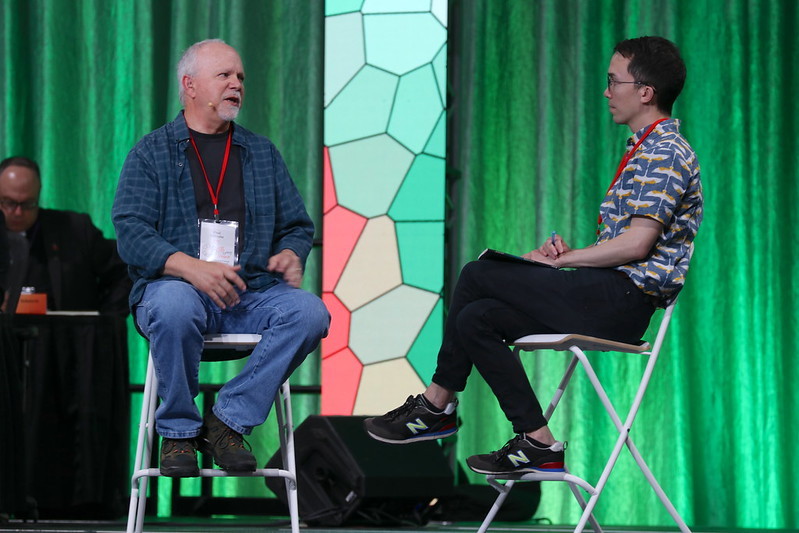
Rev. Paul Chilcote: What to teach, how to teach, and what to do

Rev. Paul Chilcote addresses participants at the 2024 NCJ Conference. Photos by NCJ communicators.
At the 2024 North Central Jurisdictional Conference, Rev. Paul Chilcote, an award-winning author and retired United Methodist minister and theological educator, led three learning sessions focused on Wesleyan theology and practices. Read a summary for each one and access the video recordings for each session. The sessions can be used in adult Sunday school classes, small group studies, or for personal faith formation.
What to Teach: A Practical Theology of Love
In the first presentation, Chilcote focused on practical theology in the Wesleyan tradition, specifically addressing how to teach the concept of love as central to the United Methodist's faith. He emphasizes love as a verb demonstrated through action and relationship rather than an abstract idea.
"So, if you think about this first original question, 'what to teach?'…the answer is actually extremely simple," said Chilcote. "The heart of the gospel is the unconditional, bounded, overwhelming love of God and God's grace."
He touched on the significance of grace as a relational experience of God's love and underscored the Wesleyan emphasis on holiness as both personal and communal. The session concludes with a prayer reflecting on these themes, emphasizing the importance of living out one's faith in the world.
After Chilcote's talk, Rev. Tyler Sit, a Minnesota Conference elder and church planter who pastors New City Church and Northeast UMC in Minneapolis, asked Chilcote some thought-provoking questions and tied some of Chilcote's points to experiences leading a church with many "ex-vangelical" Christians and people healing from a hurtful church environment in their past.
Sit and Chilcote agreed that God's redemption and love are at work in the world outside of the church. In our every relationship, we should empty ourselves and relinquish all things contrary to God's way so that the Spirit can fill us with the kind of love displayed in Jesus.
Watch the talk on What to Teach: A Practical Theology of Love.
How to Teach: Learning Through Spiritual Practices
In the second session, Dr. Paul Chilcote addressed the importance of spiritual practices in the Wesleyan tradition.
Chilcote emphasizes the interconnectedness of key spiritual practices: prayer as the foundation, scriptural engagement, Christian fellowship, and the Eucharist as nourishment for mission. He argues that these practices are not merely inward-focused but shape believers into loving individuals who serve the world.
"My friends, engaging in these spiritual practices, praying, immersing ourselves in Scripture, having religious talk, conversation, in fellowship with others, and sharing around the table. These are the places where we learn how to love," said Chilcote.

Rev. Tyler Sit, right, leads a time of discussion with Rev. Chilcote.
At the end of Chilcote's talk about spiritual practices, Rev. Tyler Sit returned to the stage to dive deeper into some key points.
They discussed what happens in prayer from a Wesleyan perspective—where our relationship with God is nurtured in everyday life; they explored how the Eucharist is about memory, an essential part of our spiritual practice; and both agreed that perspectives of atonement are different when everyone has such different faith journeys that have led them to where they are today.
Finally, Chilcote offered a glimpse of his next talk, which explored what we need to do in a society shaped by "Christian" nationalism.
Watch the talk on How to Teach: Learning Through Spiritual Practices.
What to Do: A Community of Wide Embrace
In his final session, Dr. Paul Chilcote's third topic focused on the importance of compassion, justice, and living out the "missio dei" (mission of God) as Wesleyan Christians.
Chilcote uses the metaphor of a "wide embrace" to emphasize God's love for all people and the Wesleyan call to embody that love through acts of mercy and social justice. He weaves personal anecdotes, scriptural interpretation, and excerpts from John and Charles Wesley's writings to illustrate how compassion and justice are intertwined, particularly in combating issues like Christian nationalism, racism, and economic injustice. He concludes with a call to emulate Christ's love and create a more just and compassionate world.
Watch the talk on What to Do: A Community of Wide Embrace.